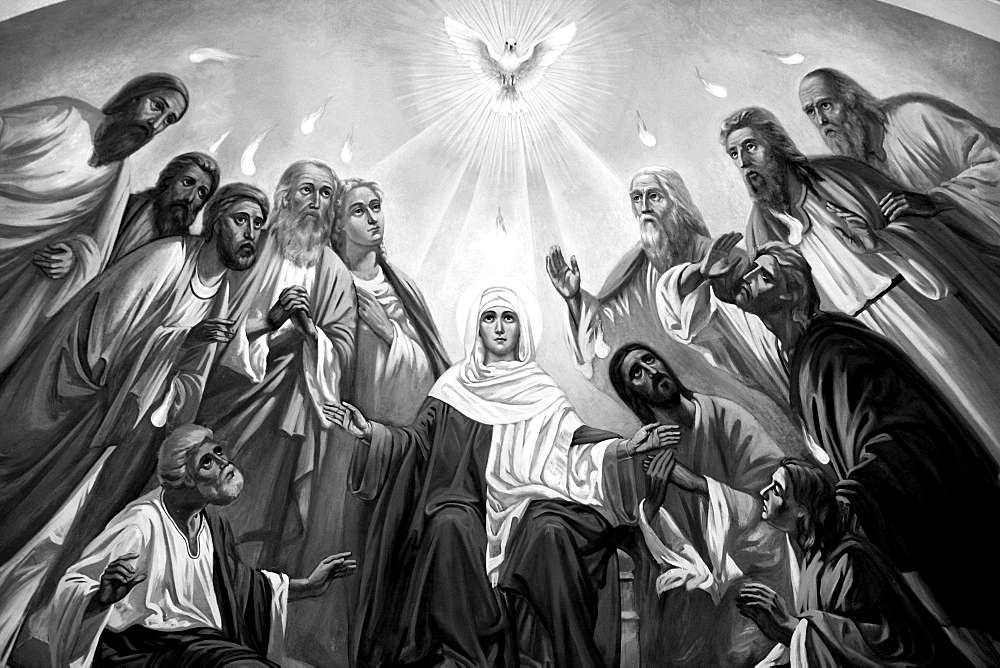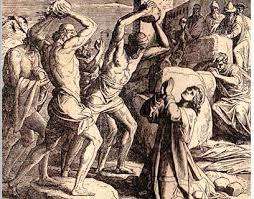

From the Unknown God to the Revealed God Theological Reflections on Paul’s Areopagus Address
Dr. Shaibu Abraham
The book of Acts provides historical narratives of three missionary journeys undertaken by Paul and his co-workers (AD 46–48; 49–52; and 53–57). During these journeys, they visited major Greek urban centres, including Thessalonica, Corinth and Athens (Acts 17:1–18:18; 20:1–6). Paul visited Athens during his second missionary journey around AD 50, where he delivered a speech to Greek philosophers at the Areopagus. This second journey took place immediately after the Jerusalem Council. The Apostle Paul was well acquainted with the major cultures of his time, having been educated in both Judaism and Greek traditions (Acts 21:39; 22:3). His Hellenistic background, Roman citizenship, and rhetorical skill (Acts 22:23–29) equipped him to engage effectively with both Jews and Greeks. On this journey, Paul was accompanied by Silas, who was also a Hellenistic Jew and Roman citizen (Acts 16:37). After receiving a vision to go to Macedonia (Acts 16:9–10), they travelled to Berea, then continued 30 kilometres southeast to the Aegean coast and arrived in Athens (Acts 17:15).
The City of Athens
It is important to know about the city of Athens to comprehend the Areopagus speech. Athens was named in honour of the goddess Athena. It was also known for many unusual statues that were scattered around the city in every available space. Even though Athens was not in its glory days at the time of Paul’s visit (Acts 17:15–16), it retained its reputation as a philosophical centre and a centre for rhetorical study. Under Roman rule, however, Athens was a “free and allied city” within the Roman Empire. Besides, throughout the Graeco-Roman world, Athens was known as the centre of art and philosophy and was the cradle of democracy during its golden age (478-431 B.C.). By Paul’s time, Greco-Romans believed that cultic statues connected the human world with the invisible world of gods, spirits, and the dead. They saw these statues as special and deeply spiritual. This situation brought Paul into conflict with the Athenians. His conviction was that a true living God “made the world and everything in it,” and did not live in human-made temples or gold, silver, or stone images made by human skill (Acts 17:24, 29).
Furthermore, Athens served as the “headquarters of four prominent philosophical schools: the Academy, the Lyceum, the Garden, and the Porch. Between 480 and 404 BC, Athens flourished economically and culturally as a result of impressive military victories. In Athens, the first democracy was established, a city-state governed by elected politarchs, who were answerable to the people (Acts 17:8). Athens also had notable personalities in almost every aspect of its civilization. Great playwrights such as Aeschylus (the father of tragedy) and Herodotus and Thucydides, the fathers of history, were also born in Athens. Another fifth-century Athenian, Hippocrates, has been dubbed the father of Western medicine. Socrates, the father of Western philosophy, and great philosophers such as Plato and Aristotle were all from Athens. These great institutions and personalities made Athens a great place in ancient world.
Paul in Areopagus
Acts 17:13–15 mentions Paul’s arrival in the city of Athens. After facing strong opposition from the Jews in Thessalonica, Paul was sent away by the believers for his safety and arrived in Athens alone, while Silas and Timothy remained behind. While waiting for his companions to join him, Paul began to explore the city, particularly the city square where the Areopagus was located.
The Areopagus, meaning “the Hill of Ares,” was named after the Greek god of war. In Roman terms, it was known as the Hill of Mars. In ancient Athens, a respected council of elder statesmen called the Areopagites—former chief magistrates—held trials and hearings there. By the first century AD, their role had become more limited but still included oversight of religious matters and public morals. This made the Areopagus a fitting place for Paul’s hearing regarding his new teachings.
Paul saw that “the city was full of idols,” and he was “greatly distressed” (Acts 17:16). It is probable that Paul also viewed the 500-foot hill rising above the city, where the famous temple of Athena stood in the city. The Athenians worshipped Zeus, Athena, and the rest of the Greek pantheon (the so-called “Twelve Olympians”). They also worshipped many lesser deities and even paid homage to “the unknown god.” Many ancient literary and epigraphic sources confirm the existence of altars in Athens and other Greek locations dedicated to “unknown gods.” Paul’s distress was not simply personal discomfort but a profound spiritual concern, rooted in his monotheistic worldview and apostolic mission. Therefore, he began to argue to anyone “who happened to be” in the “marketplace” (Acts 17:17).
Athens’ open-space marketplace, known as the Agora, was a public gathering place used for many purposes. People from all social groups—city officials, businesspeople, philosophers, loafers, and visitors—met there daily to buy and sell, hear news, and discuss politics, social issues, and religion. Luke writes, “All the Athenians and the foreigners who lived there spent their time doing nothing but talking about and listening to the latest ideas” (Acts 17:21). This social environment presented Paul with an ideal setting to expound his gospel message and explain the new Christian faith to a general audience. Paul’s arguments about Jesus and resurrection of the dead drew the attention of some local intellectuals: “A group of Epicurean and Stoic philosophers began to debate with Paul. Some of them asked, ‘What is this babbler trying to say?’ Others remarked, ‘He seems to be advocating foreign gods.’ They said this because Paul was preaching the good news about Jesus and the resurrection. Then they took him and brought him to a meeting of the Areopagus, where they said to him, ‘May we know what this new teaching is that you are presenting?’” (Acts 17:18-19). Thus, Paul received an opportunity to present the one true God, the Creator of the universe and all humanity, and to proclaim Jesus Christ, the Man appointed by God as the Saviour of all.
The Unknown God to the Revealed God
Paul began his speech by referring to a strange sight he had encountered while exploring the city of Athens, an altar dedicated “to an unknown God.” Using this as a point of contact, he addressed his audience as extremely religious (which some commentators interpret as superstitious). Paul then introduced the true nature of God, who is fully revealed through Jesus Christ (v.31). The altar inscribed “to an unknown god” reflected the Athenians’ acknowledgment of a divine being they did not know.
From this introduction, Paul moved to the core of his message: “So, you are ignorant of the very thing you worship—and this is what I am going to proclaim to you. The God who made the world and everything in it is the Lord of heaven and earth and does not live in temples built by human hands. And He is not served by human hands, as if He needed anything. Rather, he himself gives everyone life and breath and everything else” (Acts 17:23b–25).
The audience listening to him was primarily composed of Epicureans and Stoics. The Epicureans were the deists of the day (who believed in a God who does not directly intervene in the affairs of the world), while the Stoics were pantheists (who believed that God is identical with the universe and exists in all things). The Epicureans took their name from Epicurus (341–270 B.C.), whose philosophical and ethical worldview was based on the materialistic atomic theory of Democritus. Even the gods were viewed as, in essence, material in this system. Pleasure was seen as the chief end in life, and the highest pleasures were understood not as sensual ones but as pleasures of the mind, particularly tranquillity—being free from both passions and superstitious fears. The gods were seen as in similar way, being far removed from the lives of human beings and taking no real interest in them.
The Stoics were essentially materialists, for even the essence of God and the soul was understood to be composed of highly refined matter. The goal of the Stoic system was to live in accord with the rational principle that indwelt all things, and thus to live according to nature. Like the Epicureans, the Stoics emphasized the pre-eminence of reason over emotions, and also believed in self-sufficiency or autonomy as the highest good. They were also highly principled regarding ethical and civic duties. However, these philosophies were opposed to the Christian doctrines of God, sin, redemption, and eternal life.
God as the Creator and Sustainer
At the heart of Paul’s speech was Biblical revelation which was theocentric and monotheistic in nature. In17:24, Paul presents the unknown God as “the one Creator God of all the universe, and its contents.” Paul presented a series of statements about God and His character. This same God is Lord of both heaven and earth (cf. Ex. 20:11; Isa. 42:5; Acts 14:15). For Paul, this God is a personal Lord (kurios), who governs and cares for all that He has made including this Athenian audience. His presentation of the unknown god to the creator of all leads to the argument that He is beyond the idols and temples: if God is the Creator and Lord of the cosmos, then it is unthinkable that His presence is confined to human-made shrines (cf. 1 Kings 8:27; Isa. 57:15; Acts 7:48). Since God does not live in human-made temples, humans cannot reduce God to a statue or a place or in a shrine. Paul here emphasizes the independence of God with the statement, “neither is He served by human hands, as though He needed anything.” “He Himself gives to all life and breath and all things.”
It is obvious that Paul presents God as the transcendent Creator who made “the world and everything in it,” challenging the Stoic belief in a cyclical universe and the absence of a personal deity. Drawing from the Hebrew Scriptures, Paul affirms that God cannot be confined to temples made by human hands, a disturbing reality in Athens, given the visible presence of Athens’ grand sanctuaries like the Parthenon. He emphasizes God’s sovereignty over all nations, declaring that from one man, God created every nation and determined their times and boundaries. Paul unequivocally argued that the divine purpose is that humanity might seek and find God, who is near to everyone.
Moreover, in his Areopagus address, Paul presents a powerful vision of God as the Sustainer, Saviour and sovereign Lord of all humanity. Drawing from both Jewish Scriptures and Greek philosophy, Paul proclaims that “from one man [God] made all the nations… and marked out their appointed times… so that they would seek him and perhaps reach out for him and find him” (Acts 17:26–27). Paul emphasizes that God is not distant but immanently present—“for in him we live and move and have our being”—a truth affirmed by Greek poets like Epimenides and Aratus, whom Paul quotes to connect with his audience. Paul argues that since humans are God’s offspring, it is futile to think of the divine as an object made of gold, silver, or stone. God is not confined to temples or sustained by human efforts, but rather He gives life, breath, and everything else. Paul’s message thus affirms God’s transcendence and immanence, His role as Creator of all nations, and His desire for a relationship with humanity and their salvation.
A Call to Repent
After introducing the one true and living God as the Creator and Sustainer to the Athenians, Paul urged them to repent from their futile practices of idol worship and building grand temples. He called them to come to a true knowledge of God and His truth, turning away from their ignorance. Paul then proclaims that while God once overlooked such ignorance, He now commands everyone to repent. This is because God has appointed a day to judge the world through a specific man—Jesus Christ—who has been chosen as the Judge of all humanity. Greek thought did not accommodate such an eschatological judgment, but Paul proclaimed that both the day of judgment and its appointed Judge have been firmly set. Though he does not mention Jesus by name, Paul clearly refers to Him—the one in whom God’s purpose is fulfilled. As Paul somewhere else says, “on the day when, according to my gospel, God, through Jesus Christ, will judge the secret thoughts of all” (Rom. 2:16).
Paul also emphasizes that it was God’s plan to make all nations from one man, assigning them their times and boundaries, but ultimately uniting them into one people through Christ. To confirm this truth, Paul points to the resurrection—God's proof that Jesus is the appointed Judge and Saviour of all humanity. Yet many Greeks found the idea of resurrection foolish (1 Cor. 1:23). As Acts 17:32 records, some mocked when they heard Paul speak of the resurrection. This response is not surprising, considering that Athenians were taught by Apollo at the founding of the Areopagus that, “When the dust has soaked up a person’s blood, once he is dead, there is no resurrection.” However, while some mocked, others were curious and said, “We will hear you again about this.” At the end of his sermon, Luke notes that some listeners “joined him and became believers including Dionysius the Areopagite and a woman named Damaris, and others with them” (v.34).
As we summarise our discussion, Paul’s theology of God in Acts 17 highlights several essential truths. First, God is the Creator of the world and does not dwell in temples made by human hands (Acts 17:24), challenging the Greek belief in gods residing in physical sanctuaries. Second, God is completely self-sufficient and not served by human hands; rather, He is the one who provides life, breath, and all things to humanity (Acts 17:25). Third, Paul affirms the unity of the human race by teaching that all people descend from one ancestor and that God has sovereignly determined their appointed times and boundaries (Acts 17:26–27). Moreover, Paul introduces the Christian conviction that this same God will judge the world in righteousness through Jesus Christ and bring about resurrection, thus fulfilling His eternal plan of salvation for humanity.


















